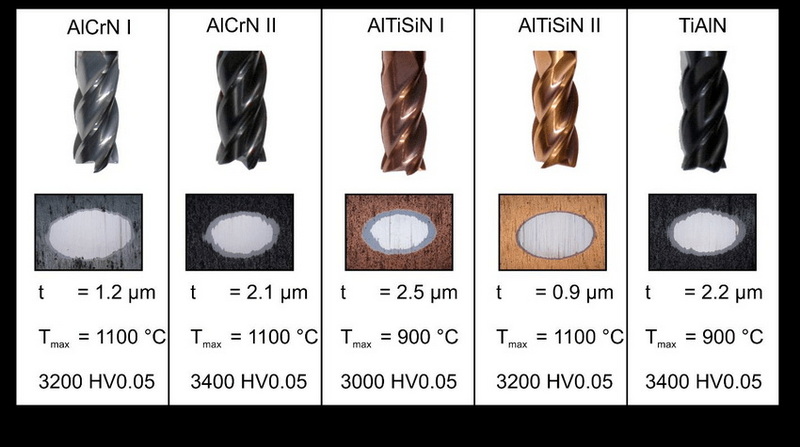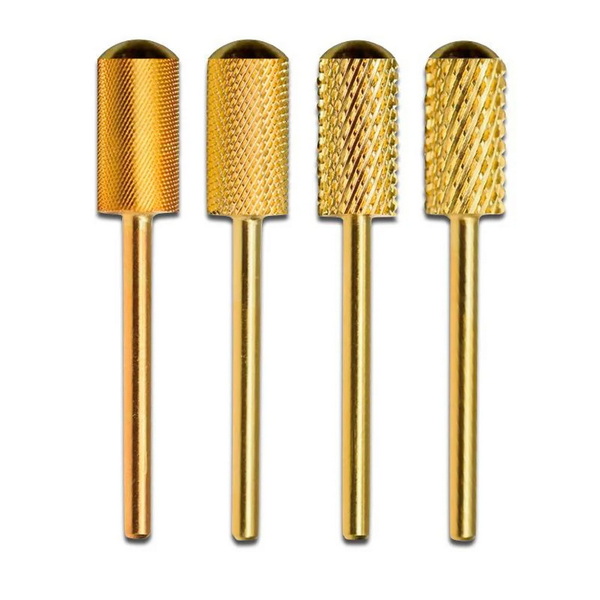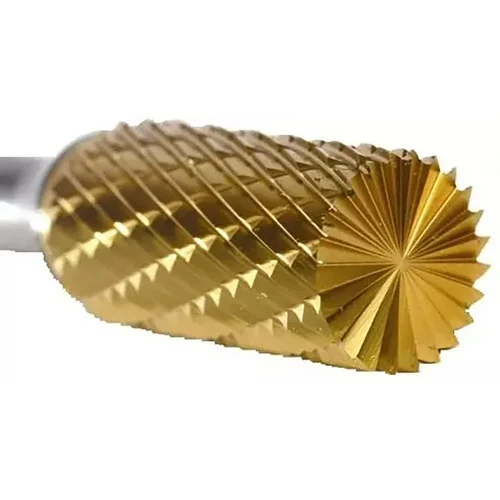Content Menu
● Introduction to Tungsten Carbide
>> Properties of Tungsten Carbide
● Coatings for Tungsten Carbide
>> 1. Titanium Nitride (TiN) Coatings
>> 2. Aluminum Oxide (Al2O3) Coatings
>> 3. Chromium Carbide (Cr3C2) Coatings
>> 4. CVD Tungsten Carbide Coatings
>> 5. Diamond-Like Carbon (DLC) Coatings
● Applications of Coated Tungsten Carbide
● Benefits of Coatings on Tungsten Carbide
● Challenges and Future Developments
● Conclusion
● FAQ
>> 1. What are the primary benefits of applying coatings to tungsten carbide?
>> 2. Which coating is best for high-temperature applications?
>> 3. Can CVD tungsten carbide coatings be used in corrosive environments?
>> 4. How do TiN coatings improve tool performance?
>> 5. What is the typical thickness of CVD tungsten carbide coatings?
● Citations:
Tungsten carbide is renowned for its exceptional hardness and wear resistance, making it a crucial material in various industrial applications, from cutting tools to aerospace components. However, despite its robust properties, tungsten carbide can benefit from additional coatings to enhance its performance, particularly in terms of corrosion resistance and surface finish. This article explores the types of coatings that can be applied to tungsten carbide, their applications, and the benefits they provide.

Introduction to Tungsten Carbide
Tungsten carbide (WC) is a chemical compound composed of tungsten and carbon atoms, known for its high hardness and melting point. It is often used in the form of a cermet, where tungsten carbide particles are bound together with a metallic matrix, typically cobalt or nickel, to enhance ductility and toughness.
Properties of Tungsten Carbide
- Hardness: Tungsten carbide is one of the hardest materials used in industrial applications, with a hardness that can exceed 90 on the Rockwell C scale.
- Wear Resistance: It offers excellent resistance to wear and abrasion, making it ideal for use in high-wear environments.
- Thermal Properties: Tungsten carbide has a high melting point and good thermal conductivity, which are beneficial in high-temperature applications.
Coatings for Tungsten Carbide
While tungsten carbide itself provides excellent wear resistance, additional coatings can enhance its performance by improving corrosion resistance, reducing friction, or achieving specific surface finishes.
1. Titanium Nitride (TiN) Coatings
Titanium nitride coatings are commonly applied to tungsten carbide tools to improve surface hardness and reduce friction. TiN coatings are known for their golden color and are often used in cutting tools to enhance wear resistance and reduce tool wear during machining operations.
2. Aluminum Oxide (Al2O3) Coatings
Aluminum oxide coatings are used to provide additional wear resistance and thermal insulation. They are particularly useful in high-speed machining applications where heat buildup can be a significant issue.
3. Chromium Carbide (Cr3C2) Coatings
Chromium carbide coatings offer excellent corrosion resistance and are often used in environments where both wear and corrosion are concerns. These coatings are particularly beneficial in chemical processing and marine applications.
4. CVD Tungsten Carbide Coatings
Chemical Vapor Deposition (CVD) tungsten carbide coatings are advanced nano-structured materials that provide enhanced hardness and toughness without the need for cobalt or nickel binders. These coatings are ideal for applications requiring high wear resistance and corrosion protection, such as in aerospace and oil drilling equipment.
5. Diamond-Like Carbon (DLC) Coatings
Diamond-like carbon coatings are known for their low friction and high wear resistance. They are often applied to tungsten carbide components used in sliding contacts or where reduced friction is critical, such as in mechanical seals and bearings.
Applications of Coated Tungsten Carbide
Coated tungsten carbide components are used across various industries due to their enhanced properties:
- Aerospace: Coatings like TiN and Al2O3 are used on turbine blades and engine components to improve wear resistance and reduce friction.
- Oil and Gas: CVD tungsten carbide coatings are applied to drilling tools to enhance durability in harsh environments.
- Machining Tools: TiN and Al2O3 coatings are common on cutting tools to extend tool life and improve machining efficiency.
- Automotive: DLC coatings are used in engine components to reduce friction and improve fuel efficiency.

Benefits of Coatings on Tungsten Carbide
The application of coatings to tungsten carbide offers several benefits:
- Enhanced Corrosion Resistance: Coatings like chromium carbide provide additional protection against corrosion.
- Improved Surface Finish: Coatings can achieve specific surface finishes, reducing friction and improving component performance.
- Increased Tool Life: By reducing wear and corrosion, coatings can significantly extend the service life of tools and components.
- Reduced Maintenance: With improved durability, coated tungsten carbide components require less frequent maintenance, reducing downtime and costs.
Challenges and Future Developments
Despite the advantages of coatings on tungsten carbide, there are challenges to be addressed:
- Adhesion Issues: Ensuring strong adhesion between the coating and the substrate is crucial for maintaining performance.
- Cost and Complexity: Some coating processes can be expensive and complex, limiting their widespread adoption.
- Environmental Concerns: The use of certain metals in coatings raises environmental concerns, prompting research into more sustainable alternatives.
Future developments in coating technology are expected to focus on improving adhesion, reducing costs, and developing environmentally friendly coatings. Advances in nanotechnology and the use of bio-inspired materials are also promising areas of research.
Conclusion
Tungsten carbide is a versatile material that can be further enhanced with various coatings to meet specific application requirements. Whether it's improving corrosion resistance, reducing friction, or achieving a precise surface finish, coatings play a critical role in maximizing the performance of tungsten carbide components. By understanding the types of coatings available and their applications, industries can optimize the use of tungsten carbide to improve efficiency and reduce maintenance costs.

FAQ
1. What are the primary benefits of applying coatings to tungsten carbide?
The primary benefits include enhanced corrosion resistance, improved surface finish, and increased tool life by reducing wear and friction.
2. Which coating is best for high-temperature applications?
Aluminum oxide (Al2O3) coatings are beneficial for high-temperature applications due to their thermal insulation properties.
3. Can CVD tungsten carbide coatings be used in corrosive environments?
Yes, CVD tungsten carbide coatings offer excellent corrosion resistance and are suitable for use in corrosive environments.
4. How do TiN coatings improve tool performance?
TiN coatings improve tool performance by enhancing surface hardness and reducing friction, which helps in extending tool life and improving machining efficiency.
5. What is the typical thickness of CVD tungsten carbide coatings?
CVD tungsten carbide coatings can be produced up to 100 microns thick, which is unique for hard CVD coatings.
Citations:
[1] https://htscoatings.com/blogs/our-craft-our-culture/three-tungsten-carbide-thermal-spray-coatings-and-their-uses
[2] https://www.thermalspray.com/need-tungsten-carbide-coatings/
[3] https://www.haydencorp.com/tungsten-carbide-coatings
[4] https://www.precisioncoatings.com/capabilities/coatings/carbide/
[5] https://shop.machinemfg.com/tungsten-carbide-coating-comprehensive-guide/
[6] https://www.industrialplating.com/materials/tungsten-carbide-coatings
[7] https://www.asbindustries.com/coating-materials/carbide-coating-materials/tungsten-carbide-coatings
[8] https://hardide.com/wp-content/uploads/2020/05/Corrosion_20101.pdf
[9] https://htscoatings.com/pages/tungsten-carbide
[10] https://www.bruker.com/en/products-and-solutions/elemental-analyzers/eds-wds-ebsd-SEM-Micro-XRF/quantax-eds-for-sem/ticn-hard-coatings-for-tungsten-carbide-cutting-tools.html
[11] https://www.linde-amt.com/resource-library/articles/tungsten-carbide
[12] https://www.samaterials.com/content/how-does-the-new-tungsten-carbide-coating-strengthen-aircraft-parts.html
[13] https://kermetico.com/coating-materials/tungsten-carbide-wc-co-coatings
[14] https://assets.linde.com/-/media/celum-connect/2025/01/16/14/05/tungsten_carbide_calendar_roll_193694.jpg?impolicy=focal-point&cw=1200&ch=630&fx=576&fy=150&r=b4085b0646&sa=X&ved=2ahUKEwiTwcWpntCMAxWlk1YBHduCNGkQ_B16BAgIEAI
[15] https://www.engineerlive.com/content/carbide-coatings
[16] https://www.ep-coatings.com/news/applications-of-tungsten-carbide-coatings-in-the-aerospace-industry.html
[17] https://www.atcgroup.com.au
[18] https://www.oerlikon.com/metco/en/products-services/materials/carbides/
[19] https://www.sciencedirect.com/science/article/abs/pii/S0263436821003048
[20] https://www.arielcorp.com/support/application-manual/compressor/cylinder/tungstencarbide.html
[21] https://kermetico.com/wp-content/uploads/2016/11/HVAF-WC-Co-Tungsten-Carbide-Cobalt-Spray-Coatings-Properties-Structure-and-Applications.png?sa=X&ved=2ahUKEwjCoumsntCMAxVfcPUHHVl8I2cQ_B16BAgHEAI
[22] https://www.gordonengland.co.uk/microphotographs.htm
[23] https://www.gettyimages.com.au/photos/tungsten-carbide
[24] https://www.haydencorp.com/photo-gallery
[25] https://www.gordonengland.co.uk/pmg3.htm
[26] https://www.alphatek.co.uk/what-is-hvof-tungsten-carbide-coating/
[27] https://www.metalizingspecialists.com/past-projects-gallery/thermal-spray-tungsten-carbide-metallizing-segments/
[28] https://www.hoganas.com/en/powder-technologies/surface-coating/products/hvof/carbides/
[29] https://www.instagram.com/quali.tech/reel/C9-VWrMOWEG/
[30] https://www.thermalspray.com/hvaf-tungsten-carbide-thermal-spray-vs-hard-chrome-plating/
[31] https://www.shutterstock.com/image-photo/spalling-tungsten-carbide-coating-on-plunger-1434824261
[32] https://www.nbcbearings.com/tungsten-carbide-carbon-coating-in-ldb/
[33] http://www.tungsten-carbide.com.cn/tungsten-carbide-coating.html
[34] http://www.wococarbide.com/Uploads/2017-07-31/597edb1697a16.pdf
[35] https://www.pcimag.com/articles/113102-new-tungsten-carbide-powders-for-hvof-applications
















